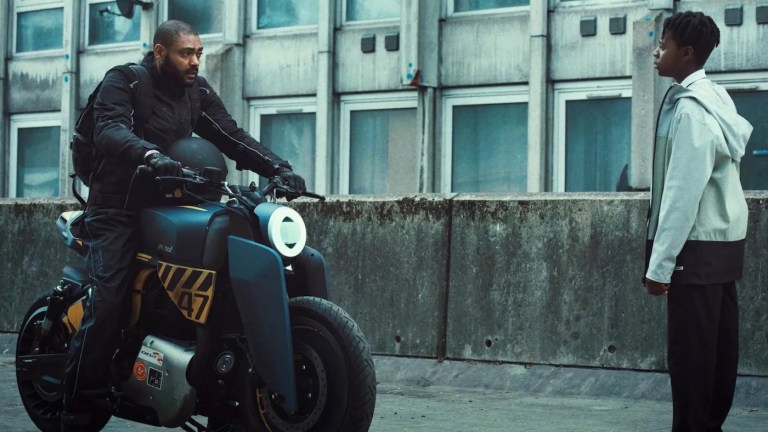The Kitchen Review: Daniel Kaluuya’s Directorial Debut Is a Big Sci-Fi Swing
Daniel Kaluuya shows promise as a co-director in his first movie behind the camera, even if The Kitchen cannot make a full meal out of its sci-fi dystopia ingredients.

For more than a few years now, Daniel Kaluuya has been at the forefront of great and allegorical science fiction: Get Out, Nope, even Spider-Man: Across the Spider-Verse. His collaborations with talents like Jordan Peele and Ryan Coogler have burrowed into the minds of audiences with all the clarity of a spoon smacking a teacup. However, in his own mind, there turns out to be an even more oppressive sci-fi vision. And it’s one with brutal timeliness, and no cathartic TSA in sight.
The Kitchen, which marks the directorial feature debut of both Kaluuya and Kibwe Tavares, is a project the two of have been dreaming about since a fortuitous barbershop discussion; they took the concept to Sundance in 2016 when, well before Get Out’s release, The Kitchen was selected for the Sundance Institute’s Screenwriting and Directing Lab; and now the idea has become hard and easily accessible reality on the most popular streaming service in the world. In some ways this is fitting, too, since The Kitchen plays a lot like a particularly bleak episode of Black Mirror.
Set in a dystopian vision of London shaded in the color of Soylent Green, The Kitchen follows Izi (Kane Robinson), a thirtysomething British man of Nigerian descent. He lives in the titular Kitchen, an impoverished but tightly united community of immigrants and first, second, and third generation Brits—almost all of whom are Black. While the events of the film occur an indeterminate amount of time into the future, the Kitchen’s London looks a lot like the current one, including with how any last vestiges of foreign heritage or communal pride are being eradicated by the encroachment of gentrification and the developers who come with it. It really is a dystopia, then, when in the future everything is destined to look like a Starbucks counter.
Hence why the Kitchen has already been condemned for demolition by the time the movie begins. Legally-speaking, this makes Izi and his neighbors squatters. Not that Izi minds when we meet him; he has dreams of upgrading to a spacious modern single occupancy apartment, and he is going to get there by working for Life After Life, a euphemistic euthanasia program for the poor. The supposedly benign service even turns the remains of the elderly into potted plants, which relatives can then visit for a time. Still, working there is an okay gig. That is until one of Izi’s old flames turns up in a box, alongside her living, prepubescent son Benji (Jedaiah Bannerman). The kid also just so happens to be aged the same number of years since Izi last saw the boy’s mother. Now Benji has no place to go other than the Kitchen.
The immediate appeal, and ultimate frustration, of The Kitchen is how commanding Kaluuya and Tavares’ sense of time and place is throughout the film. Our first sojourn through morning life outside Izi’s crummy apartment is immediately visceral, with the neon-lit food stands and amusement games glowing bright at all hours of the day in the Kitchen’s courtyard. The symbiotic squalor and vitality immediately evokes elements of Blade Runner, but with a modern twist. Indeed, the Kitchen resembles what some folks in the UK right now most dread: a melting pot of cultures, lifestyles, and ethnicities that do not go back to the Norman Conquest.
The intricacies and depth of the newbie directors’ world-building is immersive and inviting. The screenplay, which Kaluuya co-wrote with Joe Murtagh, has the confidence to not hold audiences’ hands. There is a self-assuredness that allows the production design by Nathan Parker, as well as the directors’ shared eye for authenticity, speak for itself. We are asked to slowly piece together how Life After Life figures in this Britain of tomorrow, or why residents of the Kitchen begin banging on windows moments before another wave of authoritarian coppers in riot gear turn up to intimidate and harass their fellow Londoners.
Unfortunately, the movie similarly keeps viewers at arm’s length when it comes to investing in the plight and emotional turmoil of Izi and Benji’s messy relationship. There is a definite specificity to how the dynamic is slowly developed across 110 minutes, but the film never really lets the audience know what is occurring in its characters’ heads and hearts. Nor does it give much reason to care beyond the despairing situation both father and son find themselves in.
This emotional dissonance carries over to the structure of The Kitchen as a whole, which has stuffed its pantry with a veritable feast’s worth of tantalizing ideas and intriguing morsels. But they’re never blended into a satisfying meal. The narrative strands—of what is going down at Life After Life, the dreary oppression of those living in the Kitchen’s slums, and even the banal emptiness of the bougie world Izi dreams about ascending into—are carefully placed in parallel across the film’s table, but the young filmmakers cannot quite make them intersect in any meaningful way.
The Kitchen is an ambitious science fiction effort which reveals a real genre filmmaker’s eye for creating vistas both alien and intimately familiar. Kaluuya and Tavares have earned the right to step behind the camera again, and hopefully with a better handle on their narrative when they do so. But like many first time films, The Kitchen is rough around the edges and a little too in disarray to be of full use for its hungry chefs.
The Kitchen premieres on Netflix on Jan. 19.
